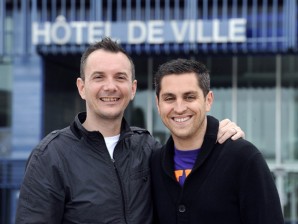France to hold first gay wedding amid protest fears

Picture taken on May 18, 2013 in front of the city hall of Montpellier, southern France, shows Vincent Autin (L) and his partner Bruno Boileau posing for a photograph. The socialist mayor of Montpellier, Helene Mandroux, will celebrate on May 29, 2013 at the city hall of Montpellier the first French homosexual marriage with the wedding uniting Vincent Autin and his partner Bruno. Montpellier is known as being the “French San Francisco” and was elected by the French gay magazine Tetu on December 2012 as being the “most friendly” French town. After months of acrimonious debate and hundreds of protests that have occasionally spilled over into violence, France’s National Assembly approved on April 23, 2013 a bill making the country the 14th to legalise same-sex marriage. AFP / PASCAL GUYOT
MONTPELLIER, France — France’s first official gay wedding takes place Wednesday in the southern city of Montpellier amid tight security and fears of protests after months of opposition that saw tens of thousands take to the streets.
Vincent Autin, 40, and Bruno Boileau, 30, will exchange vows at Montpellier city hall at 1530 GMT in the presence of hundreds of guests, including the Socialist government’s spokeswoman Najat Vallaud-Belkacem.
Vallaud-Belkacem said she was attending the ceremony as a private citizen and not a state representative, after the government backed away from sending officials fearing it would be accused of politicising the event.
“I have only invited friends and family. We didn’t want to turn our marriage into a celebrity event,” Autin said.
Though officially a secular republic, France is overwhelmingly Catholic, and the issue of gay adoption and marriage — a key campaign pledge of President Francois Hollande — sparked a deeply divisive debate.
Article continues after this advertisementOn Sunday, at least 150,000 demonstrators took to the streets of Paris in the latest in a series of protests to denounce the new law, which authorises both gay marriage and adoptions by same-sex couples.
Article continues after this advertisementThe largely peaceful gathering later turned violent as riot police battled hundreds of right-wingers.
Opponents have vowed to protest at the marriage in Montpellier as well, and authorities have called in up to 100 police, with another 80 in reserve, to provide security.
“It is an exceptional event and we want everything to go as smoothly as possible,” said Frederic Loiseau of the local prefect’s office.
International media have been converging on Montpellier — known as the “French San Francisco” for its gay-friendly reputation — and Mayor Helene Mandroux, who will preside over the ceremony, said she was surprised by the interest.
“We are the 14th country to recognise gay marriage,” she said. “If there are so many journalists maybe it is because they were surprised by the reaction of opponents. They were astonished that there could be such violence in the country of human rights.”
She said she would give a speech during the ceremony addressing the fact that “for weeks there has been a phenomenon of intolerance” in France.
Opposition to the measure started as a grassroots campaign backed by the influential Roman Catholic Church. The right-wing opposition then jumped into the fray and the movement ballooned.
Supporters and opponents of the bill began protesting last autumn when it was adopted by the cabinet and continued to hold regular demonstrations throughout the country as it made its way through France’s parliament.
The definitive vote in the French parliament came on April 23, when the law was passed legalising both homosexual marriages and adoptions by gay couples.
Despite the widespread opposition, a survey published Sunday in the Journal du Dimanche said nearly three-quarters of the French were tired of the protests and thought they should stop.